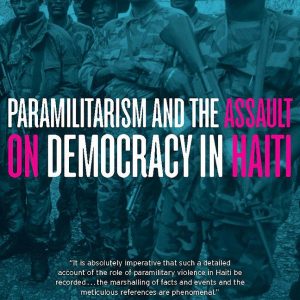SEPTEMBER 12, 2012
Terrorizing Haiti’s Poor Majority
Haiti’s Blood-Soaked Paramilitaries
by BEN TERRALL
Jeb Sprague’s definitive Paramilitarism and the Assault on Democracy in Haiti (Monthly Review Press, 2012) is the product of seven years of research and writing. Since the 2004 Bush Administration-backed overthrow of the democratically-elected Jean Bertrand Aristide government, journalist and scholar Sprague has been investigating key players behind that coup. His work is especially strong on interviews with figures in anti-Aristide political and paramilitary networks, and on unearthing cables from the U.S. embassy in Port-au-Prince and other relevant documents through Freedom of Information Act (FOIA) requests. Sprague also combed through all the Haiti-related documents released through the activist project Wikileaks.
This volume is thoroughly sourced, containing 84 pages of footnotes. Though it is thus a scholarly work, it is also the product of the author’s immersion in solidarity with Haiti’s poor majority, resulting in an impassioned alternative to the obfuscation which has often passed for analysis of the 2004 coup.
Sprague’s meticulous dissection of rightist propaganda about Ariside’s record emanating from Haiti and Washington makes his book an essential companion to philosopher Peter Hallward’s similarly thorough volume Damming the Flood. Comparing the reaction to the first coup against an Aristide administration in 1991 to the 2004 operation, Sprague writes, “… the paramilitaries and many of the powerful groups backing the opposition had historically been connected in different ways. Scholars and human rights groups had extensively documented these connections after the 1991 coup. But the international press largely failed to probe them during Aristide’s second government, instead more often than not credulously recycling the ‘peaceful’ opposition’s claims.”…
Read the entire review in CounterPunch

Comments are closed.